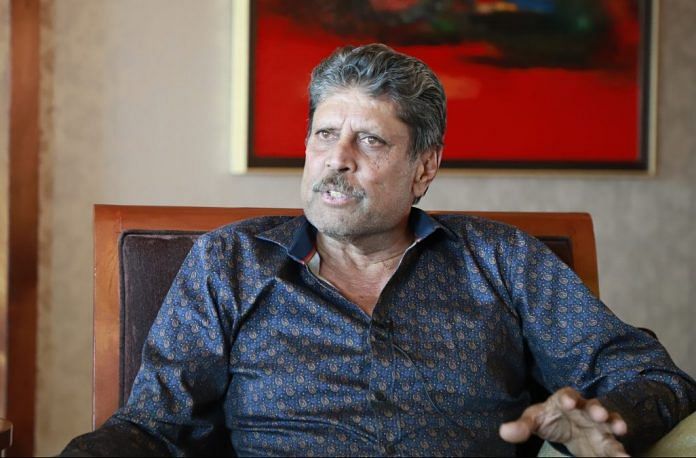Former India captain says it’s unfortunate that a generation of fans has lost out on watching international cricket in Pakistan, ‘for no fault of theirs’.
New Delhi: Cricketing icon Kapil Dev believes his friend and fellow all-rounder Imran Khan is the ideal man to bring back cricket to troubled Pakistan, because of his passion.
Khan’s Pakistan Tehreek-e-Insaf party emerged as the largest in the recent National Assembly polls, and if it’s able to cobble together the requisite numbers, as looks likely, he will be prime minister.
Cricket must return
Dev, who made his Test debut in Faisalabad in 1978, spoke at length about how different it was to play in the country, and that it was sad there had been hardly any international cricket there since 2009, when the Sri Lankan team bus was attacked in Lahore.
“Playing in Pakistan is very different. They are aggressive…emotional, ruthless and very gutsy. Ready to fight. That is their character. When you play with them over a period of time, you realise that,” he said.
The reason Pakistan is so different from Australia or England or West Indies, Dev said, is because “they are also a very emotional people, they can’t take defeat”.
Dev said Pakistan had gone through “a very rough time”, and that “for no fault of theirs”, young boys had no exposure to international cricket as foreign teams were refusing to play because of the security situation.
Since 2009, Pakistan have made a home away from home in the UAE, but Dev said cricket must return to Pakistan, and Khan is the one who can make it possible.
“They can play in Dubai, they can play in Timbuktu also… it doesn’t matter. But the people of Pakistan must get the opportunity to see them play. Dubai is not their country. I hope under Imran Khan things become better. The way he looked after his team… if he can do that with his country, it will be wonderful,” he said.
“He has that craziness, that passion, that obsessiveness (junoon), which should be there. Everyone says that’s necessary to be a leader, and I agree. That’s something Imran has, that’s something (Narendra) Modi sahib has.”
Love from ancestral villages and beyond
Dev’s parents belonged to Sahiwal, in what was then called the Montgomery district in Punjab, and he reminisced about the time he visited his parents’ native villages.
“We were playing in Lahore, I said I wanted to go. Pakpattan was my mother’s village; Shayakka my father’s. It is an army area. They took me… They were very hospitable. They didn’t realise who I was. Then the village came to know ‘this is the boy’. They were very happy to see me. We spoke Punjabi with each other…Didn’t matter I was Hindu and they were Muslim,” he said.
It wasn’t just him, though; he said the reception Indian cricketers got in Pakistan was overwhelming.
“We had a wonderful time. I was 18 years old, I was so passionate about the game, I didn’t know who the prime minister of the country was. All I wanted was to play, play, play. Wasn’t like today’s world with the media, mobiles etc…Oh yes, the stadiums were full,” he added.
‘Cricket was played in English’
Dev pointed out that cricket in the subcontinent today was very different from the time he played and won India the World Cup in 1983. At the time, the elites ran the cricket boards, and there was a yawning difference between them and the players — especially when it came to the language.
“All the royals etc. who played cricket spoke English. If you spoke Hindi, you may not have been selected, even if you were good. Never ever (did the) team meeting take place in Hindi. When I came in, (that was the) first time it took place in Hindi. Earlier, it was always in English, and half the team-members did not understand English. It was very difficult,” he recalled.
“When we came, we were more Hindi-based people and we started talking in Hindi. But the cricket was played in English. Cricket is an English game, played in English. So it was very difficult to break that barrier.”
In Pakistan, Khan was able to bridge that difference to a large extent, not only because he belonged to the Lahore elite — he studied in Aitchison College, a top school in Pakistan, and went on to study at Keble College, Oxford — but because his passion rooted him to the game.
However, Dev did point out that Khan had an easier job of assimilating everyone into one team, considering that Pakistan’s team meetings have always taken place in Punjabi. Moreover, he pointed out, Pakistan is a much smaller country, and because of its size, it is much more uniform. The players understood each other as well as their administrators because, essentially, they belonged to the same geographic pool.
“India, on the other hand, is very different, a much bigger country. The south is different from the north, the east from the west. Our education systems are different, like our food and water, as well as cricket,” he said.
This is the second part of the three-part interview with Kapil Dev. The first part can be read here.



